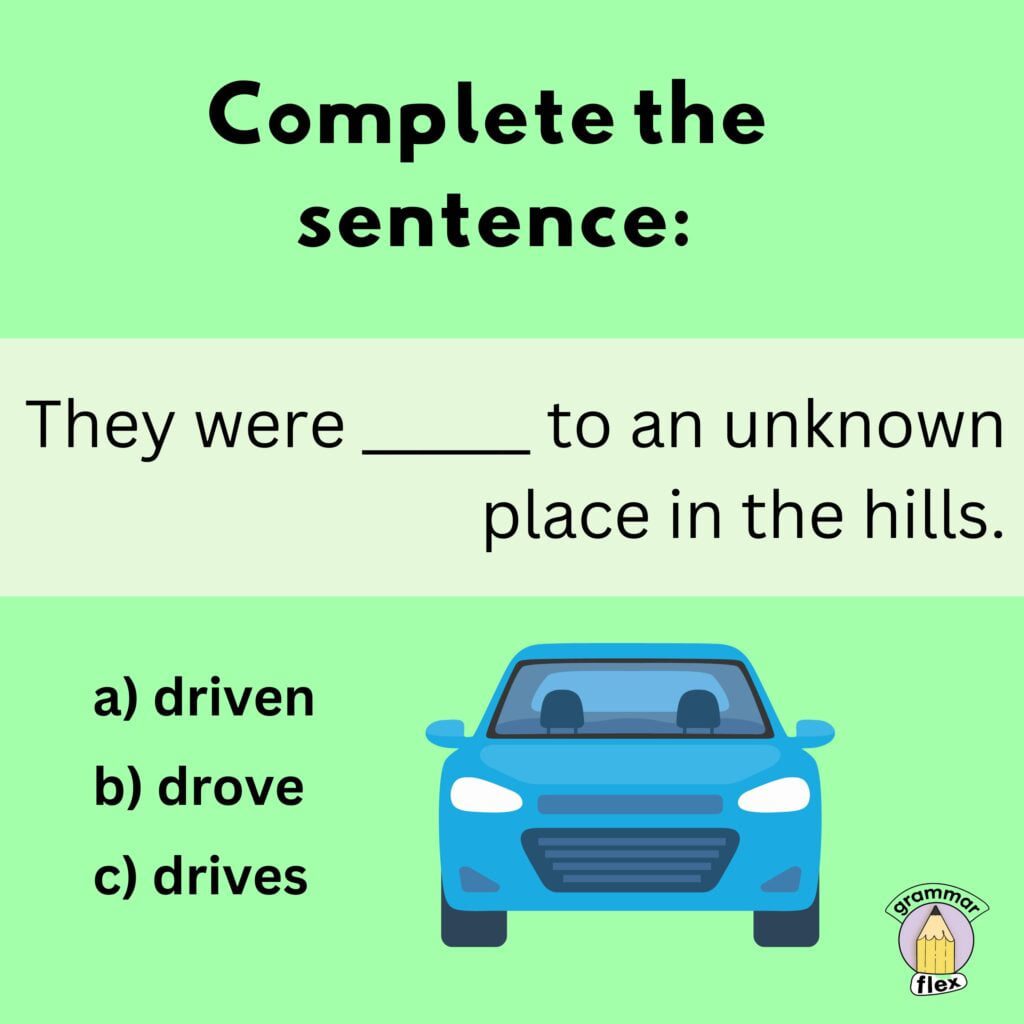
What's the past tense of "drive"?
Both drove and driven are past verb forms of the present tense verb, drive. This makes drive another one of those irregular verbs with multiple past tense forms, like ate and eaten, or bit/bitten. When it comes to these irregular verb conjugations, there isn’t really a rhyme or reason, we just have to memorize them.
Definition of drive
The verb drive refers to when someone "operates a car or other vehicle and controls its movement and direction."
- The past tense of drive is drove.
- The past participle of drive is driven.
Verb forms of 'drive'
The verb drive refers to when someone "operates a car or other vehicle and controls its movement and direction." The simple past tense form of drive, drove, shares the same spelling and pronunciation as the collective noun drove ("a herd of livestock"), but this is not the same sense in which we’re using the verb drove in this article.
Is "drive" a regular or irregular verb?
Drive is an irregular verb because its past forms do not use -ed. Instead, drive changes to drove in the past tense and driven as the past participle, following an irregular vowel-change pattern.
When to use drove vs. driven
My brother drove us to the airport.
Many attendees have driven a long way to get to the event.
The verb drive uses different forms for simple past tense and present or past perfect), it requires an auxiliary verb like have, has, or had. The simple past doesn't use a helper verb since it's a complete tense, so drove can stand alone in sentences, whereas participles require an auxiliary verb.
Similar irregular verbs
Drive is an irregular verb because its past forms do not use -ed. See the chart of other irregular verbs in the same class:
Sentence examples: drive, drove, driven
• I need to learn to drive before the road trip.
• She drives to work every morning to save time.
• They are driving through the night to reach the coast.
• I drove to Bendigo last weekend.
• He drove the tractor across the field.
• My father drove me to Bendigo to learn how to drive.
• The herd was driven toward the market at dawn.
• She has often driven that model of car in testing.
• They had driven the plough all morning before lunch.
Quotes from the media and literature
He is more like a cowboy: galloping hard to drive his herd forward, hooting at the stragglers, lassoing the wayward, moving 'em on and heading 'em up.
— J. Miles, Anat (2018)
I learnt to drive in Bendigo. My father taught me first-up and then my boyfriend at the time.
— Canberra Sunday Times, 2000
The ploughmen will be marked on how straight they can drive the plough and how they impact the ground.
— Brentwood Gazette, Oct. 2017
Fantastic demonstration this afternoon by David Charles of driving #bees at Quantock Beekeepers apiary near Spaxton #Somerset.
— social post
Synonyms & nearby words
Synonyms for drive
Nearby phrases
Common phrases with "drive" (detailed)
drive a car
drive the team
drive change
drive forward
drive home a point
drive traffic
drive innovation
Practice: drove or driven
He ______ his new car to work yesterday for the first time.
I have never ______ a truck before, only smaller cars.
She carefully ______ the golf ball straight down the fairway.
The powerful winds had ______ the rain against the window panes all night.
Please learn how to ______ before you get your license.
Origin of the verb/word, drive
Old English drifan "to compel or urge to move, impel in some direction or manner; to hunt (deer), pursue; to rush against" from Proto-Germanic *dreibanan.
FAQs
What are the past forms of 'drive'?
When is "drove" used?
When is "driven" used?
Can I use "driven" alone?
Is "drive" a regular verb?
Sources
-
"Overdrive, V." Oxford English Dictionary, Oxford UP, March 2025, https://doi.org/10.1093/OED/1199038215.
Advertisement








.webp&w=3840&q=75&dpl=dpl_13tcGbrn5BXPQFsQmuQWqib9Y3DN)